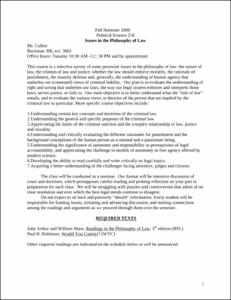Please use this identifier to cite or link to this item:
http://hdl.handle.net/10267/1599Full metadata record
| DC Field | Value | Language |
|---|---|---|
| dc.contributor.author | Cullen, Daniel E. | - |
| dc.date.accessioned | 2008-04-07T19:50:40Z | - |
| dc.date.available | 2008-04-07T19:50:40Z | - |
| dc.date.issued | 2006-08-18 | - |
| dc.identifier.uri | http://hdl.handle.net/10267/1599 | - |
| dc.description | This syllabus was submitted to the Rhodes College Office of Academic Affairs by the course instructor. | en_US |
| dc.description.abstract | This course is a selective survey of some perennial issues in the philosophy of law: the nature of law, the relation of law and justice, whether the law should enforce morality, the rationale of punishment, the insanity defense and, generally, the understanding of human agency that underlies our (contested) views of criminal liability. Our plan is to evaluate the understanding of right and wrong that underlies our laws, the way our legal system enforces and interprets those laws, serves justice, or fails to. Our main objective is to better understand what the ��rule of law�� entails, and to evaluate the various views or theories of the person that are implied by the criminal law in particular. More specific course objectives include: 1.Understanding certain key concepts and doctrines of the criminal law. 2.Understanding the general and specific purposes of the criminal law. 3.Appreciating the limits of the criminal sanction and the complex relationship of law, justice and morality. 4.Understanding and critically evaluating the different rationales for punishment and the background conceptions of the human person as a rational and a passionate being. 5.Understanding the significance of autonomy and responsibility as prerequisites of legal accountability, and appreciating the challenge to models of autonomy or free agency offered by modern science. 6.Developing the ability to read carefully and write critically on legal topics. 7.Acquiring a better understanding of the challenges facing attorneys, judges and citizens. The class will be conducted as a seminar. Our format will be intensive discussion of cases and doctrines, which presupposes careful reading and probing reflection on your part in preparation for each class. We will be struggling with puzzles and controversies that admit of no clear resolution and over which the best legal minds continue to disagree. Do not expect to sit back and passively ��absorb�� information. Every student will be responsible for framing issues, initiating and advancing discussion, and making connections among the readings and arguments as we proceed through them over the semester. | en_US |
| dc.language.iso | en_US | en_US |
| dc.publisher | Memphis, Tenn. : Rhodes College | en_US |
| dc.relation.ispartofseries | Syllabi CRN | - |
| dc.relation.ispartofseries | 17302 | - |
| dc.rights | Rhodes College owns the rights to the archival digital images in this repository. Images are made available for educational use only and may not be used for any non-educational or commercial purpose. Approved educational uses include private research and scholarship, teaching, and student projects. For additional information please contact archives@rhodes.edu. Fees may apply. | - |
| dc.subject | Political Science, Department of | en_US |
| dc.subject | Syllabus | en_US |
| dc.subject | Curriculum | en_US |
| dc.subject | Academic departments | en_US |
| dc.subject | Text | en_US |
| dc.subject | 2006 Fall | en_US |
| dc.title | POLS 216-01, Issues: Philosophy of Law, Fall 2006 | en_US |
| dc.type | Syllabus | en_US |
| Appears in Collections: | Course Syllabi | |
Files in This Item:
| File | Description | Size | Format | |
|---|---|---|---|---|
| 2006_fall_POLS_216-01.pdf | 39.48 kB | Adobe PDF |  View/Open |
Items in DSpace are protected by copyright, with all rights reserved, unless otherwise indicated.